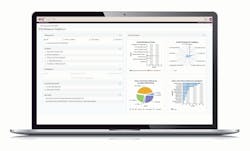Making Sure Product Quality Stays at the Top
Here in the editorial world, the closest we have to a quality management system (QMS) is our own eyes—well and spellcheck. But for the most part, we must heavily rely on our own eyesight for error detections. And let me tell you, it's a paranoia that we have developed an unhealthy relationship with.
However, when it comes to the manufacturing world, manufacturers don't need to have this paranoia and nor should they when it comes to product quality and consistency. Most companies already have a quality management system in place, whether manual or automated. But it’s important to invest in an efficient and effective enterprise QMS solution that fits unique needs in today’s increasingly demanding world.
NED spoke with Morgan Palmer, Chief Technology Officer at ETQ, to find out not only how beneficial and important a QMS system is, but also why its latest product, ETQ Reliance, offers a great benefit to companies of all sizes. And it's not just using your eyesight to detect errors.
New Equipment Digest: What risks are companies taking without having a QMS system in place?
Morgan Palmer: Without a QMS to help manage quality efficiently and effectively, companies are at greater risk of ushering a faulty product through the supply chain and into consumers’ hands. At best, this could mean consumers have a disappointing experience; at worst, it could lead to critical, and even fatal, health or safety issues.
While consequential recalls can cost anywhere between millions to billions of dollars–severely impacting the company’s bottom line – this does not even touch the devastation that can result from tarnished brand trust, reputation, and loyalty, each of which influences long-term revenue.
NED: What exactly is ETQ Reliance and what is its main purpose?
MP: ETQ Reliance is a SaaS-based enterprise QMS solution that automates quality, compliance, and EHS processes–no matter how common or complex. Inherently flexible, the solution can adapt quickly to different types of processes, meet unique business needs, and remain agile in the face of changing business environments.
ETQ reliance also makes it easy for businesses to deploy the solution throughout an entire supply chain. Internal and external users can simply configure personal dashboards, workflows, forms, sections, fields, and reports to their needs, all without difficult programming.
ETQ Reliance currently empowers more than 500 companies (e.g., United Airlines, Subway, and L’Oréal) to not only uphold quality standards but seamlessly improve and achieve operational excellence over time.
NED: What industry is it meant for? What processes does it consolidate?
MP: ETQ Reliance can be used across virtually any industry. We serve brands in markets including aerospace and defense, aviation and transportation, biotechnology, consumer goods, electronics, general manufacturing, energy and utilities, food and beverage, life sciences and pharmaceuticals, medical devices, metals and mining, and technology.
The solution is designed to consolidate, harmonize, and automate all quality management processes. For example, it optimizes quality management in processes such as supply chain management, nonconformance handling, corrective action, enterprise risk management, new product introduction and complaint handling health and safety control and environmental impact reduction.
NED: What kinds of errors/inconsistencies in products does the system catch?
MP: The system is designed to catch any error that might lead to a defective product or service. Depending on the point of deployment during the product lifecycle, ETQ Reliance can identify anything from a flaw in the design to a machine malfunction.
The earlier a problem is identified, the more affordable a correction will be. If the system identifies an error in the design phase, for example, it can be adjusted before any materials are used for production. When a defect is caught in final testing, the manufacturer needs to start over, scrapping the impacted items and wasting resources. If an error is caught in the field, and a recall must be issued, the costs of returning and replacing the product, as mentioned previously, are massive.
It’s important to remember, though, that while an error might not occur in initial phases, anything could happen at any point during the production process, and thus quality should be monitored from end-to-end.
NED: What unique features does ETQ Reliance offer that similar products do not offer?
MP: ETQ Reliance stands out as a QMS solution due to various factors. Most notably, the software can be integrated with the industry’s only advanced analytics solution, ETQ Insights. The information-driven system provides quality professionals with a packaged solution dedicated to collecting and analyzing data specific to quality.
ETQ Reliance also differentiates itself through its flexible, SaaS-based system, automation functionalities, and supply chain quality management features. It can also integrate with other systems that enable workflow across an entire organization (e.g., ERP systems to incorporate production data, CRM solutions to filter in customer feedback, and PLM for product design information).
NED: Do users need to purchase any other equipment to use this system?
MP: Users do not need to purchase any additional equipment to use ETQ Reliance. In fact, because the solution is SaaS-based, the onboarding process is quite simple and inherently cost-effective. ETQ can provide companies with an alternative, secure, and user-friendly solution that can be accessed by users in real-time.
Additionally, ETQ makes the onboarding process as straightforward as possible for users with ETQ Academy, the company’s online training program that offers a range of learning options from very brief “microlearnings” to in-depth certification courses.
ETQ Reliance also allows for seamless integration with other technologies. So, while other equipment is not required, customers can use the technology in tandem with other enterprise systems.
NED: ETQ just released ETQ Insights, an add on for ETQ Reliance users. Can you explain what it is and how it benefits users?
MP: ETQ Insights is an analytics solution, purpose-built to serve the needs of quality professionals working with all forms of data about quality. It offers users access to quality data lakes, synchronization data layers, and configurable quality operational dashboards.
The solution, which can be seamlessly integrated with ETQ Reliance, allows users to analyze structured and unstructured data with a range of configurable dashboards for easy and comprehensive visualization. It gives quality practitioners the extra tool required for a comprehensive view of quality data and creates actionable insights, permits informed decision making and further enables ongoing improvement.
NED: Can companies of any size benefit from this type of system? Is this a system that all employee levels have access to?
MP: Quality maturity can vary by company and oftentimes by industry. However, quality does not discriminate by size, so any organization, from Fortune 500 companies to fast-growing startups, can reap the benefits of QMS solutions. ETQ Reliance is trusted by businesses of all sizes, like GE and Velcro, or Maple Leaf Farms and Midwest Sealing Products.
Because of our focus on usability, employees at all levels and across functions can easily access and use the ETQ Reliance platform. There are two main types of users: the core users and casual users. Core users are typically smaller numbers of people – those advanced quality professionals in the system every day. For example, inspectors, quality engineers and managers would be considered core users.
Casual users, on the other hand, are the rest of the employees in the organization impacted by quality (so, everyone else). Companies should make sure that everyone has access to QMS solutions and encourage them to provide feedback about quality when necessary. Having a system that makes it easy to bring in those casual users is critical to building a culture of quality. And, ETQ Academy simplifies onboarding for every employee, allowing them each to quickly understand how to use the platform.
Additionally, having QMS solutions on web browsers and mobile devices for all stakeholders (employees, customers and suppliers) is critical for enabling wider organization usage. Quality shouldn’t be confined within the four walls of one business; instead, it should be enabled for the whole entire ecosystem.
About the Author
Laura Davis
Editor-in-Chief, New Equipment Digest
Laura Davis is the editor in chief of New Equipment Digest (NED), a brand part of the Manufacturing Group at EndeavorB2B. NED covers all products, equipment, solutions, and technology related to the broad scope of manufacturing, from mops and buckets to robots and automation. Laura has been a manufacturing product writer for eight years, knowledgeable about the ins and outs of the industry, along with what readers are looking for when wanting to learn about the latest products on the market.

